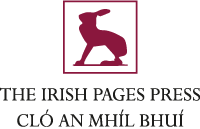The Buried Breath by Ciarán O’Rourke – Poetry Ireland Review – review 26th July 2021
In a generation of young poets with a marked preference for academic archness and high/low culture mash-ups, Ciarán O’Rourke blazes a singular trail. The Buried Breath, one of the first collections published by The Irish Pages Press, is a debut demonstrating a social conscience and a sustained engagement with world literature. From the striking cover image of migrants struggling on a foundering boat to O’Rourke’s series of responses to figures such as Miklós Radnóti, alongside his energetic and fluent translations of Catullus, this is a collection which merges an eclectic range of interests. In ‘Postcards from Palestine’, the challenging task of giving voice to a war-torn nation is achieved through a poem which builds in intensity through four sections to an impassioned plea for empathy:
Remember my words,
as if they were warmed by the blood in my wrist,
as if they were cut from the coil of my tongue.
The task of weaving these strands together is achieved through O’Rourke’s strong instinct for metre and rhythm, favouring regularly stressed shortlined tercets which lend the poems a strong musicality. They also allow little room for indulgence of any kind, leading to a singular kind of cleanboned poem; strong at the core yet delicately rendered, with lines such as ‘History is one / disaster , feeding / off another, or: // what poems are made / to witness/ and withstand’, from ‘The Killing March’, arresting the reader with their elegant directness. If the choice of this form married with the typographical choices occasionally leads to a relatively brief poem feeling rather drawn out over a number of pages, the freshness of the language keeps the reader engaged, as in ‘Guatemala, 1967’, a poem in memory of Otto René Castillo, which begins with the memorable
lines:
Say nation
and the deer and moon
unlatch a shadow;
the darkness
quickens;
a candle blows.
O’Rourke’s translations and ‘variations’ warrant special mention as an exercise which may seem unusual for a debut author, but here these intimate engagements with poets both ancient and modern allow O’Rourke room to flex creative muscles within set forms, leading to an intriguing
merging of the poet’s singular style with that of his forebears. This series culminates in O’Rourke’s own poem to Catullus; an invigorating torrent of language:
Catullus, dawn-young and delicate as rain,
I thank a thousand gods I never met you.
For days you’ve lingered, brazen on the corners,
hot-fingering your puny cock, screaming love
to some piss-pale heaven, under which love poems
burst impossibly from life-embezzled beds.
A poet who approaches both the ancient and the modern with the same insight and sensitivity, O’Rourke surely has a long and distinguished poetic career ahead.
By Jessica Traynor


